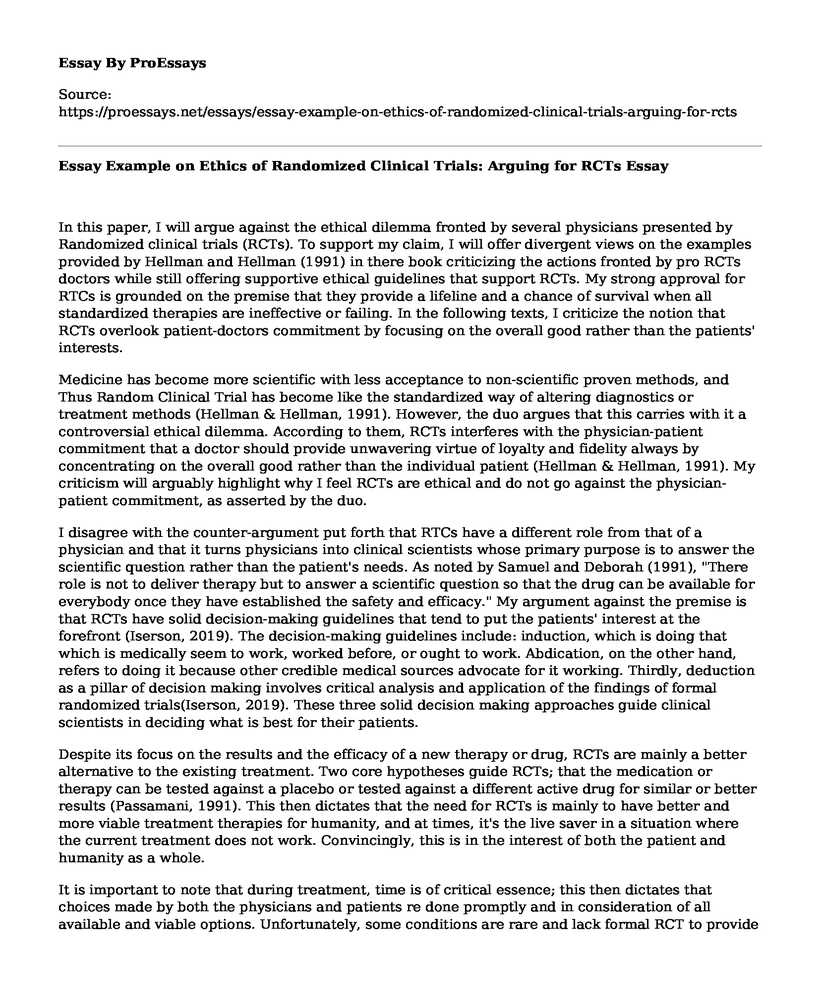In this paper, I will argue against the ethical dilemma fronted by several physicians presented by Randomized clinical trials (RCTs). To support my claim, I will offer divergent views on the examples provided by Hellman and Hellman (1991) in there book criticizing the actions fronted by pro RCTs doctors while still offering supportive ethical guidelines that support RCTs. My strong approval for RTCs is grounded on the premise that they provide a lifeline and a chance of survival when all standardized therapies are ineffective or failing. In the following texts, I criticize the notion that RCTs overlook patient-doctors commitment by focusing on the overall good rather than the patients' interests.
Medicine has become more scientific with less acceptance to non-scientific proven methods, and Thus Random Clinical Trial has become like the standardized way of altering diagnostics or treatment methods (Hellman & Hellman, 1991). However, the duo argues that this carries with it a controversial ethical dilemma. According to them, RCTs interferes with the physician-patient commitment that a doctor should provide unwavering virtue of loyalty and fidelity always by concentrating on the overall good rather than the individual patient (Hellman & Hellman, 1991). My criticism will arguably highlight why I feel RCTs are ethical and do not go against the physician-patient commitment, as asserted by the duo.
I disagree with the counter-argument put forth that RTCs have a different role from that of a physician and that it turns physicians into clinical scientists whose primary purpose is to answer the scientific question rather than the patient's needs. As noted by Samuel and Deborah (1991), "There role is not to deliver therapy but to answer a scientific question so that the drug can be available for everybody once they have established the safety and efficacy." My argument against the premise is that RCTs have solid decision-making guidelines that tend to put the patients' interest at the forefront (Iserson, 2019). The decision-making guidelines include: induction, which is doing that which is medically seem to work, worked before, or ought to work. Abdication, on the other hand, refers to doing it because other credible medical sources advocate for it working. Thirdly, deduction as a pillar of decision making involves critical analysis and application of the findings of formal randomized trials(Iserson, 2019). These three solid decision making approaches guide clinical scientists in deciding what is best for their patients.
Despite its focus on the results and the efficacy of a new therapy or drug, RCTs are mainly a better alternative to the existing treatment. Two core hypotheses guide RCTs; that the medication or therapy can be tested against a placebo or tested against a different active drug for similar or better results (Passamani, 1991). This then dictates that the need for RCTs is mainly to have better and more viable treatment therapies for humanity, and at times, it's the live saver in a situation where the current treatment does not work. Convincingly, this is in the interest of both the patient and humanity as a whole.
It is important to note that during treatment, time is of critical essence; this then dictates that choices made by both the physicians and patients re done promptly and in consideration of all available and viable options. Unfortunately, some conditions are rare and lack formal RCT to provide answers necessary to answer the clinical queries sufficiently. This does not, therefore, means that physicians let their patient lose out on what could be a live-saving RCT, as pointed out, RCT could be a live saver for some conditions and so not performing them because of the unpredictable consequences is same as not having the patients' interests on the forefront. Conclusively, I would arguably assert that RCTs are not only ethical but also necessary from the number of lives saved and enriched by it.
References
Hellman, S., & Hellman, D. S. (1991). Of mice but not men. New England Journal of Medicine, 324(22), 1585-1589. https://doi.org/10.1056/nejm199105303242208
Iserson, K. V. (2018). "Go ask Alice": The case for researching schedule I drugs. Cambridge Quarterly of Healthcare Ethics, 28(1), 168-177. https://doi.org/10.1017/s0963180118000518
Passamani, E. (1991). Clinical trials - Are they ethical? New England Journal of Medicine, 324(22), 1589-1592. https://doi.org/10.1056/nejm199105303242209
Cite this page
Essay Example on Ethics of Randomized Clinical Trials: Arguing for RCTs. (2023, May 03). Retrieved from https://proessays.net/essays/essay-example-on-ethics-of-randomized-clinical-trials-arguing-for-rcts
If you are the original author of this essay and no longer wish to have it published on the ProEssays website, please click below to request its removal:
- Leadership in the Nursing Profession Essay
- Use of Smartphones on Patient Care and Information From the Database
- Research Paper on Nurses: Compassion, Depression, Patient Satisfaction & Workplace Tension/Stress
- Research Paper on Obesity Among African Americans in Texas
- Providing Palliative Care at End-of-Life: Assessing Total Pain & Effective Communication - Essay Sample
- Research Paper on Sport Medicine Issues: Examining the Impact of Sport Injuries on Athletes
- Research Paper Sample on Risk of Falling High Among Adults Aged 65 and Above with Cognitive Decline







